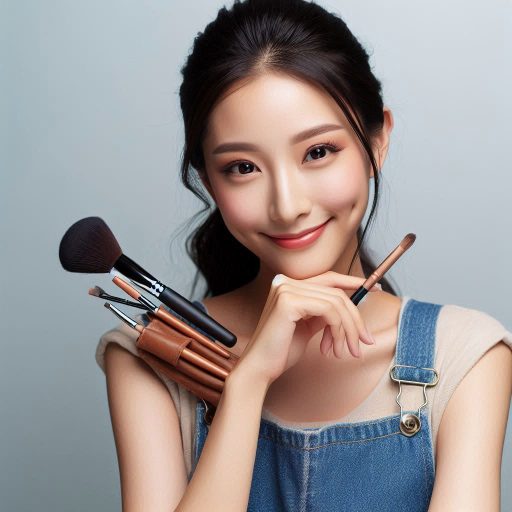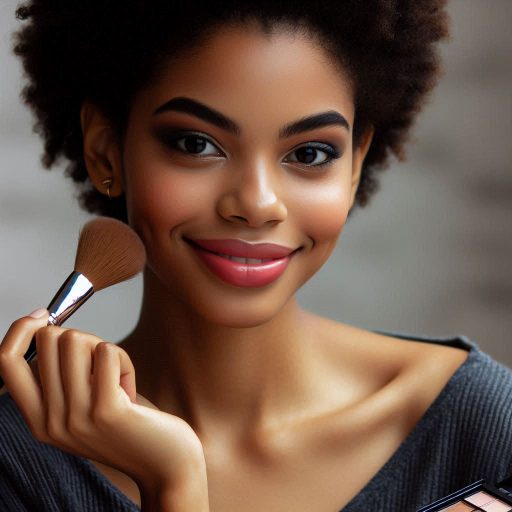Introduction
Aspiring fashion stylists need to possess essential skills to thrive in their career.
These skills play a crucial role in ensuring success in the competitive fashion industry.
This blog post aims to highlight the top skills required for a successful fashion stylist career.
- Creativity: Being creative is essential for a fashion stylist to think outside the box and create unique looks.
- Attention to Detail: Having a keen eye for detail helps fashion stylists create polished and well-coordinated outfits.
- Trend Awareness: Keeping up with the latest fashion trends is vital for a fashion stylist to stay relevant in the industry.
- Communication Skills: Effective communication is necessary for collaborating with clients, designers, and other industry professionals.
- Organization: Staying organized helps fashion stylists manage deadlines, schedules, and multiple projects simultaneously.
- Adaptability: Being adaptable allows fashion stylists to work in a fast-paced and ever-changing industry with ease.
- Styling Techniques: Having a strong understanding of styling techniques, such as color coordination and body types, is crucial for a fashion stylist.
- Networking: Building a strong network within the fashion industry can open up new opportunities and collaborations for fashion stylists.
Creativity and Fashion sense
Importance of creativity in the fashion industry
Creativity and fashion sense are essential for a successful career as a fashion stylist.
In the fast-paced fashion industry, creativity helps you stand out and craft unique looks.
Your ability to blend colors, patterns, and textures can make a bold statement and elevate your client‘s style.
Being creative means thinking outside the box and setting trends, not just following them.
A fashion stylist with strong creativity can transform any outfit into a work of art.
How having a good fashion sense can set you apart as a fashion stylist
Having a good fashion sense sets you apart as a fashion stylist.
It allows you to understand which styles work best for different body types, personalities, and occasions.
Fashion sense involves knowing how to combine pieces in ways that reflect current trends while highlighting individual uniqueness.
Clients seek stylists who have a knack for choosing clothing that fits their personal tastes while staying fashionable.
Your strong fashion sense can build your reputation and attract high-profile clients.
Tips on how to enhance creativity and develop a keen eye for fashion
To enhance creativity, expose yourself to various fashion sources like magazines, runway shows, and social media. Inspiration can come from anywhere, including art, music, and culture.
Collaborate with other creatives to learn new techniques and expand your vision.
Develop a keen eye for fashion by studying designers, analyzing different fashion eras, and staying updated with evolving trends.
Attending workshops and experimenting with bold looks can also sharpen your skills.
In essence, creativity and fashion sense are invaluable for a fashion stylist.
By cultivating these skills, you can establish a successful career in the fashion industry. Keep pushing boundaries and refining your eye for style.
Read: Art Conservation: Beyond Museums and Galleries
Transform Your Career Today
Unlock a personalized career strategy that drives real results. Get tailored advice and a roadmap designed just for you.
Start NowExcellent Communication Skills
Communication is key in the world of fashion styling.
As a fashion stylist, you will need to communicate effectively with a variety of people, including clients, designers, photographers, and other fashion professionals.
Your ability to convey your ideas and concepts clearly will directly impact your success in this competitive industry.
The need for effective communication with clients, designers, and other fashion professionals
When working with clients, it is crucial to listen carefully to their needs and preferences and communicate clearly to ensure that you are meeting their expectations.
Whether you are styling a photo shoot or selecting outfits for a red carpet event, being able to effectively communicate with designers and other industry professionals is essential.
Strong communication skills will help you build strong relationships and networks within the fashion industry, which can lead to new opportunities and collaborations.
The importance of being able to clearly convey ideas and concepts to others
As a fashion stylist, you will often need to translate your creative vision into reality.
Whether you are pitching ideas to a client, discussing concepts with a designer, or directing a team of assistants, your ability to clearly convey your ideas will be crucial.
Being able to articulate your vision and collaborate effectively with others will help you bring your creative projects to life and set you apart as a top stylist in the industry.
Examples of how good communication skills can positively impact a fashion stylist career
Good communication skills can open up a world of opportunities for a fashion stylist.
For example, a stylist who is able to effectively communicate with clients and understand their needs will be more likely to secure repeat business and referrals.
Additionally, strong communication skills can help a stylist build a positive reputation within the industry, leading to new opportunities for collaborations, partnerships, and editorial features.
Ultimately, clear and effective communication is essential for a successful career as a fashion stylist.
Read: The Role of Art Conservators in Museums
Strong Organizational Skills
How being organized is crucial for managing multiple projects and clients
Being organized is essential for fashion stylists juggling multiple projects and clients.
Fashion stylists often handle various tasks like sourcing outfits, managing fittings, and coordinating photo shoots.
Organizational skills help stylists ensure every task is completed on time without missing deadlines.
An organized stylist can effectively prioritize, resulting in smoother project execution.
Importance of keeping track of trends, budgets, and schedules
Keeping track of trends, budgets, and schedules is equally important for a stylist’s success.
Fashion evolves rapidly, and stylists need to stay updated on the latest looks.
Additionally, managing budgets ensures they provide clients with affordable yet trendy options.
Scheduling appointments and meetings efficiently helps prevent last-minute chaos.
Tips on how to improve organizational skills and stay on top of tasks as a fashion stylist
To improve organizational skills, fashion stylists can use tools like digital planners or project management apps.
These tools allow stylists to categorize tasks and set deadlines.
Setting clear priorities and breaking larger projects into smaller, manageable steps can reduce stress and increase productivity.
Developing a system for tracking fashion trends and storing inspiration, such as mood boards or saved collections, can also streamline the creative process.
Lastly, consistent review and reassessment of schedules can help stylists stay on top of their workload.
By staying organized, stylists can better manage client expectations, avoid last-minute changes, and handle multiple projects seamlessly.
Developing these skills will contribute significantly to a successful fashion stylist career.
Read: Famous Artworks Saved by Conservation Efforts

Attention to Detail
When it comes to being a successful fashion stylist, attention to detail is a crucial skill that sets professionals apart in the industry.
Here’s why:
Importance of paying attention to the smallest details in styling outfits
Attention to detail plays a crucial role in a fashion stylist’s success.
Small details, such as fabric textures, colors, and accessories, can make or break an outfit.
By focusing on the finer aspects of styling, a fashion stylist can create polished and cohesive looks that elevate their work.
How being detail-oriented can help create polished and cohesive looks
Being detail-oriented helps ensure that every element of an outfit aligns with the overall vision.
From choosing the right shoes to coordinating jewelry, attention to detail allows a stylist to pull together a look that feels complete.
This focus creates a sense of harmony in the outfit, making it visually appealing.
How attention to detail can make a fashion stylist stand out in the industry
A fashion stylist who excels in attention to detail will stand out in the competitive fashion industry.
For example, carefully selecting accessories that complement the outfit or choosing subtle patterns that enhance the overall aesthetic can set a stylist apart.
These small but impactful decisions show a deep understanding of fashion and style.
In high-pressure environments like photoshoots or fashion shows, attention to detail can make all the difference.
Ensuring that every garment fits perfectly and adjusting even the smallest wrinkle can create a flawless look.
Clients and fashion houses appreciate a stylist who can deliver perfection through meticulous attention to every element.
By being detail-oriented, a fashion stylist ensures their work is not only visually striking but also professionally executed.
This commitment to precision will help them build a strong reputation in the industry and lead to continued success.
Ultimately, attention to detail is a skill that can define a stylist’s career, setting them apart from others in the field.
Read: Innovative Methods in Modern Art Conservation
Knowledge of Fashion History and Trends
Having a solid understanding of fashion history and staying updated on current trends is essential for a successful career as a fashion stylist.
Importance of Staying Updated
- Being aware of the latest trends allows stylists to create relevant and cutting-edge looks for their clients.
- It shows clients that the stylist is current and knowledgeable, which can help build trust and credibility.
Inspiring Creative Styling Choices
- By having a deep knowledge of fashion history, stylists can draw inspiration from past eras and trends to create unique and innovative looks.
- Understanding the evolution of fashion can help stylists push boundaries and think outside the box when styling their clients.
Continuous Learning
- One way to stay informed about fashion history and trends is to regularly read fashion magazines, websites, and blogs.
- Attending fashion shows, industry events, and exhibitions can also provide valuable insights into current and upcoming trends.
- Networking with other fashion professionals and attending workshops or seminars can help stylists stay on top of the latest industry developments.
Overall, having a strong foundation in fashion history and trends is crucial for aspiring fashion stylists to excel in their careers and create impactful and trendsetting looks for their clients.
Ability to Work Under Pressure
Time Management
- Allocate specific time slots for different tasks to avoid feeling overwhelmed.
- Set realistic deadlines and prioritize your workload accordingly.
- Use tools like calendars or task management apps to stay organized.
Effective Communication
- Clear communication with clients, colleagues, and vendors can prevent misunderstandings.
- Being able to express your ideas and needs effectively is key.
- Practice active listening to ensure you understand others’ requirements accurately.
Stress Management Techniques
- Take short breaks to de-stress and refresh your mind.
- Incorporate mindfulness practices like meditation or deep breathing exercises.
- Physical activities like yoga or exercise can help reduce stress levels.
Flexibility and Adaptability
- Be prepared to handle unexpected challenges and changes in plans.
- Stay open to feedback and be willing to make adjustments as needed.
- Having a flexible mindset will help you navigate stressful situations more effectively.
Delegate Tasks When Necessary
- Recognize when you need support and delegate tasks to team members or assistants.
- Trust your team to handle certain responsibilities, allowing you to focus on critical tasks.
- Effective delegation can help lighten your workload and reduce stress levels.
Self-Care and Wellness
- Make time for self-care activities like exercise, hobbies, or spending time with loved ones.
- Get enough rest and prioritize a healthy work-life balance to prevent burnout.
- Seek support from a therapist or counselor if stress levels become overwhelming.
Networking and Marketing Skills
How networking is essential for building relationships and gaining exposure in the fashion industry
- Building relationships is crucial in the fashion industry for career advancement.
- Gaining exposure through networking events can lead to potential collaborations and opportunities.
- Networking allows stylists to connect with industry professionals, designers, and fashion influencers.
Importance of marketing oneself as a fashion stylist
Marketing oneself as a fashion stylist is essential to attract clients and create brand awareness.
- Developing a strong personal brand and a unique selling proposition can differentiate you from competitors.
- Utilize social media platforms to showcase your work, engage with followers, and attract potential clients.
- Create a professional website or portfolio to display your portfolio, client testimonials, and services offered.
Tips on how to network effectively and market your skills to potential clients
Tips on how to network effectively and market your skills to potential clients:
- Attend industry events, fashion shows, and workshops to meet like-minded professionals and potential clients.
- Join fashion networking groups, online forums, and social media communities to expand your reach.
- Collaborate with fashion photographers, models, and makeup artists to create a strong portfolio and gain exposure.
- Offer pro bono services or discounts to gain experience, build relationships, and attract new clients.
- Provide excellent customer service, deliver on promises, and go above and beyond to exceed client expectations.
Learn More: Top Fashion Design Trends for 2024
Conclusion
The key skills required for a successful fashion stylist career include a strong eye for detail, excellent communication and interpersonal abilities, creative thinking, trend awareness, organizational skills, and a passion for fashion.
It is crucial to continuously develop and refine these skills to stay competitive in the ever-evolving fashion industry.
By honing these abilities, fashion stylists can excel in their careers and stand out in the saturated market.
I encourage aspiring fashion stylists to start working on acquiring these essential skills early on in their careers.
By investing time and effort into developing these competencies, individuals can pave the way for a successful and fulfilling career as a fashion stylist.




